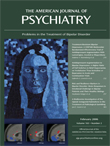To the Editor:
We wish to communicate a critical concern pertaining to psychiatric training and to the practice of psychiatry. Within the United States, there is a widely accepted standard mnemonic device that is proposed to aid clinicians in recalling and assessing the presence of the symptoms of a major depressive episode as enumerated in DSM-IV. This alphabetic mnemonic, “SIGECAPS,” is presumably often promulgated in the teaching/training curricula of psychiatry and other disciplines
(1).
With the increasing and appropriate recognition of the ubiquity of major depression in general and clinical populations
(2), we might extrapolate that the mnemonic SIGECAPS pervades the knowledge base accepted among professionals within the vast fields of medicine, psychology, and social science
(3). SIGECAPS stands for
Sleep disturbance,
Interest (diminished),
Guilt or feeling worthless,
Energy (loss),
Concentration difficulties or indecisiveness,
Appetite abnormality or weight change,
Psychomotor retardation or agitation, and
Suicide or death (acts or thoughts of).
The relevance of identifying and monitoring the progression of the symptoms of major depression is scientifically sound and nearly universally granted among mental health practitioners. As such, it will not require elaboration here.
The mnemonic SIGECAPS, although phenomenologically accurate and routinely applied, is not without significant shortcomings. It is our opinion that phonologically, heuristically, and aesthetically, this acronym is less than ideal for meaningful assimilation and practical application by students and practitioners within the multifarious disciplines pertaining to human behavior. Furthermore, the repetition of the letter “S” in the acronym, to represent both sleep disturbance and suicidal ideation, would appear to diminish the ease of remembering which symptom the “S” is intended to stand for in each instance.
We propose an alternative mnemonic: “C GASP DIE.” While it is equally accurate and at least as practical, we believe it to be superior to the conventional SIGECAPS in its connotations of the morbidity/mortality of major depression, its resultant ease of recollection, and its subjective aesthetic appeal. C GASP DIE stands for Concentration difficulties or indecisiveness, Guilt or feeling worthless, Appetite abnormality or weight change, Sleep disturbance, Psychomotor retardation or agitation, Death or suicide (thoughts or acts of), Interest (diminished), and Energy (loss).
It is our hope that educators and opinion leaders within the fields we mention will consider adopting the new acronym, “C GASP DIE,” for its speculatively superior qualities pertaining to the conceptualization and clinical consideration of the major depressive episode.

